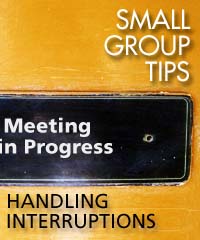Small-group interruptions

You’ve just begun your small-group discussion when in comes George, late (as always) and looking for a chair… . You’ve reached a critical part of a discussion about handling anger, and three cell phones go off — almost at once (giving you an opportunity to apply what you’re learning). Interruptions are a frequent, frustrating, inevitable part of small-group meetings. How do you handle them?
Prevention better than cure
Start by anticipating the problem. If your group is just beginning, now’s the time to lay some ground rules. Latecomers probably account for the majority of interruptions, so the first rule should be punctuality.
If your group has been together for awhile and latecomers have been a serious distraction, hold a special session at the start of the next meeting (but make sure the latecomers are present — they are the ones who need to hear this) in which you covenant together to respect one another’s time.
You may want to come up with some creative penalties for chronic lateness. For example, one small group collected a small fine to be put in a project fund. Another group made up a humorous jingle that they sang to latecomers. Make sure the whole group agrees on this idea. If the problem continues, you may need to speak to the person (or persons) in private.
Prepare your physical environment before the meeting starts. Ask people to turn of cell phones (those most notorious and shameless of all intruders). Hang a sign on the door that says, “Meeting in progress; please leave a message,” and tie a pen and pad to the doorknob.
Plan the meeting agenda as well to minimize interruptions. If you have a regular period of socializing, make it the first activity, so that latecomers miss conversation and refreshments instead of prayer or discussion. (Research shows that the best time for socializing is at the beginning anyway, because it helps establish the warmth necessary for healthy group dynamics.)
If the latecomer is a new member or visitor, be more lenient. A newcomer’s need is to be accepted as part of the group. Coming in alone will make a visitor feel overwhelmingly isolated, so be sure to recognize her or him warmly, introducing the person by name and enlarging the circle if necessary.
State the obvious
Recognizing an interruption is always the best policy for the leader. The group’s train of thought has already been broken — everyone knows where everyone else’s attention is focused — so why not admit it? Instead of pretending nothing has happened, you can quickly resolve the tension created by an interruption if you comment about it and go on.
Your remark may be merely factual — “There’s a chair right here.” Or it may be humorous. One group leader, for example, commented as a large cockroach sped across the floor and captivated the entire group, “It must be under deep conviction and wants to get out of here.” The ensuing laughter relieved the pressure and turned the group’s focus back toward the speaker.
Once you have everyone’s attention again, it’s best to repeat for the group the last comment made (whether you or someone else was speaking). This restores continuity and gets the group back on track.
Seeing the opportunities
Not all interruptions are bad; they may instead be opportunities. Several years ago a small group of college students was meeting in a room next to the campus chapel, praying for new channels of outreach on campus. They were interrupted by a knock on the door. The young man who stood on the doorstep was coming down from a drug high, anxious to talk to someone. Instead of telling him when the chaplain had office hours, they invited him inside, talked with him and prayed for him.
What if they had viewed that event as an intrusion instead of an answer to their prayer? With that in mind, our strategy must be to prepare ourselves and practice patience — so we can “redeem the time” by handling interruptions with wisdom and grace.
—Paul Thigpen. Adapted with permission from The Small Group Letter.






